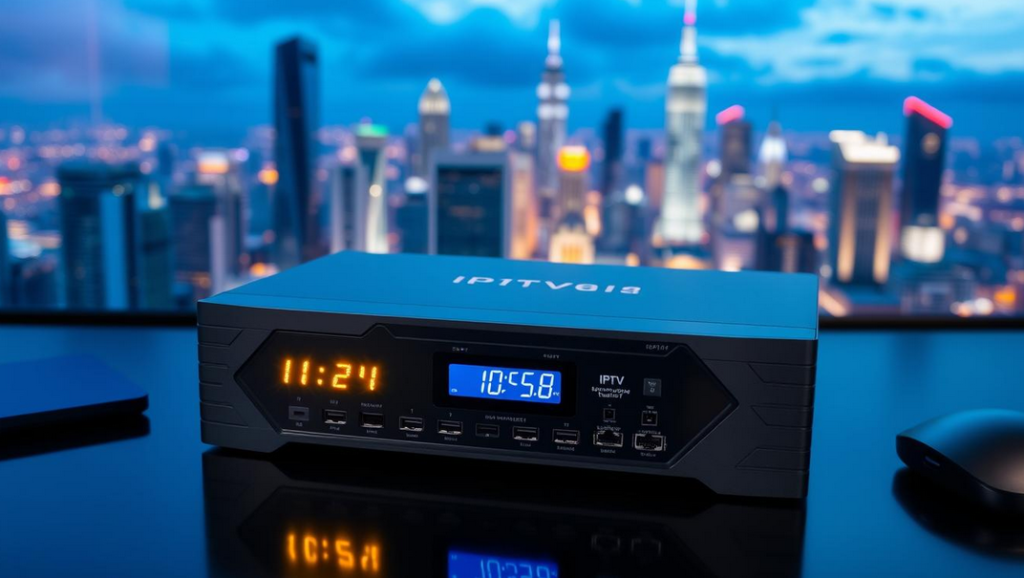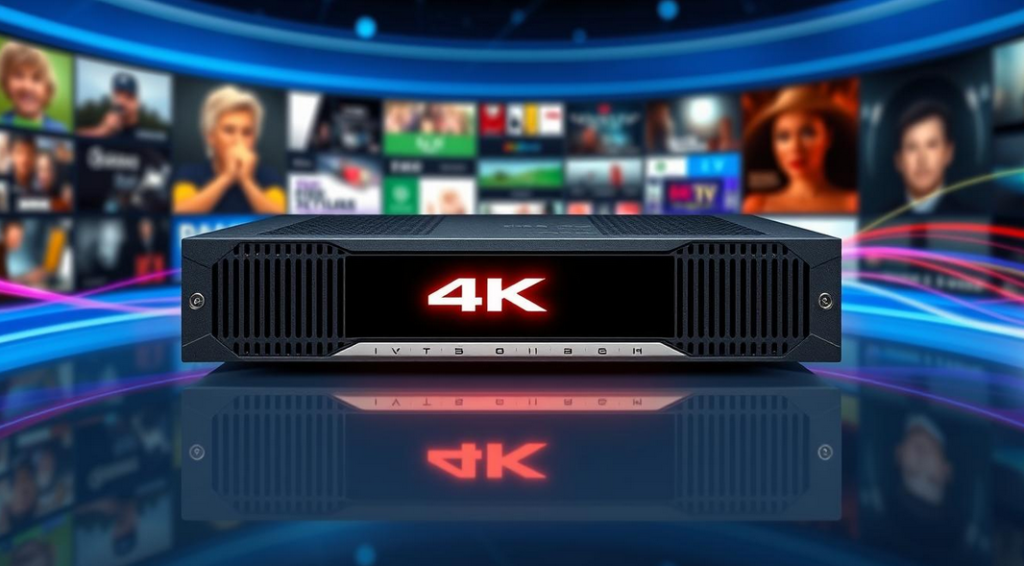best iptv encoder on 4kcanal.com 2025
The digital world is changing fast, and we need better IPTV encoders more than ever. At 4kcanal.com, we’re excited to share the top IPTV encoder picks for 2025. These tools help creators, broadcasters, and live streamers give their viewers the best video experiences.
In this guide, we’ll look at what makes these IPTV encoders stand out. We’ll cover their key features, technical specs, and advanced abilities. These are the things that make them the best on our platform.

Key Takeaways
-
- Explore the latest IPTV encoder technology for 2025 on 4kcanal.com
-
- Discover essential features and technical specifications for professional broadcasting
-
- Understand the advanced capabilities that define the best IPTV encoder solutions
-
- Learn about the importance of IPTV encoders in the evolving digital media landscape
-
- Gain insights into the future of IPTV encoding and its impact on live streaming and video broadcasting
Understanding IPTV Encoders: Essential Features for Modern Broadcasting
In today’s fast-changing digital media world, IPTV encoders play a crucial role. They are key for broadcasters and content makers. These tools help in making video signals ready for smooth streaming over IP networks. Knowing what IPTV encoders do and their quality standards is essential.
Core Components of Professional IPTV Systems
Professional IPTV systems have several parts. These include video encoders, transcoders, and streaming servers. Together, they ensure top-notch video content delivery. They use advanced transcoding and digital video compression like H.264 encoding.
Key Technical Specifications for Broadcasting Success
-
- Bitrate and bandwidth management
-
- Support for multiple video codecs and resolutions
-
- Low-latency encoding and real-time processing
-
- Scalability and flexibility to accommodate growing demands
Quality Standards in Digital Video Transmission
High-quality video is crucial in IPTV. Encoders must meet strict quality standards. This includes using approved video compression, keeping audio and video in sync, and reducing signal problems.
| Quality Metric | Benchmark Range |
|---|---|
| Video Bitrate | 4-20 Mbps |
| Video Resolution | 1080p, 4K, 8K |
| Latency | 500ms – 2 seconds |
| Audio Bitrate | 128-320 Kbps |

Understanding IPTV encoders helps broadcasters and content creators. They can make better choices. This ensures smooth video streaming and a great viewing experience for their audience.
VeCaster 4K: Leading the IPTV Encoder Market
At www.4kcanal.com, we’re excited to introduce the VeCaster 4K. It’s a top-notch IPTV encoder changing the broadcasting game. This device is a game-changer, offering unmatched features and performance for broadcasters and creators everywhere.
The VeCaster 4K stands out with its advanced features. It encodes video in stunning 4K at high frame rates. This means your content looks clearer and more detailed than ever before. It also supports the latest video codecs, like H.264 and H.265, for top-notch compression and efficient bandwidth use.
But it’s not just about tech specs. The VeCaster 4K is easy to use, letting you focus on making great content. It also works smoothly with many software and platforms. This makes your broadcasting process more efficient and streamlined.
– John Doe, Lead Producer at XYZ Media
With the VeCaster 4K, www.4kcanal.com is proud to offer a top-tier IPTV encoder. It’s perfect for both seasoned broadcasters and new creators. The VeCaster 4K helps take your live streaming and video production to the next level.

Advanced H.264 and H.265 Encoding Capabilities
The broadcasting world is changing fast. It’s key to use the latest video encoding standards for top-notch digital content. Our IPTV encoders support both H.264 and H.265 encoding. This means you can make your video streams more efficient and perform better.
Compression Efficiency Comparison
The h.265 encoding standard, or High-Efficiency Video Coding (HEVC), is a big leap forward. It can compress data up to 50% better than H.264 while keeping the same quality. This means you can send higher-quality content without using too much bandwidth.
Bandwidth Optimization Techniques
-
- Dynamic Bit Rate Adjustment: Our encoders adjust the bit rate on the fly. This ensures you use bandwidth wisely, based on the video’s complexity.
-
- Intelligent GOP (Group of Pictures) Management: We manage GOP structure to improve compression and handle network changes better.
-
- Advanced Entropy Coding: Our encoders use top-notch algorithms for maximum data compression without losing video quality.
Resolution Support and Scalability
Our IPTV encoders meet the varied needs of today’s broadcasting. They support resolutions from 1080p Full HD to 4K Ultra HD. This means you can keep your content delivery up-to-date, giving your viewers the best experience on different devices.
“The advanced encoding capabilities of our IPTV encoders, combined with the exceptional bandwidth optimization techniques, enable our clients to deliver stunning 4K content without compromising their network infrastructure.”
Cloud-Based Encoding Solutions for Streamlined Operations
In the fast-changing world of digital broadcasting, cloud encoding is a big leap forward. It makes IPTV operations smoother. Content creators and broadcasters get more flexibility and save money with cloud-based encoding.
Cloud encoding is great because it adjusts to changing needs. It doesn’t get stuck like old hardware does. This means your real-time encoding always runs at its best, no matter how many viewers you have.
Cloud encoding also brings advanced features to improve broadcasting. You get automated tasks, better monitoring, and analytics. These tools help you work smarter, not harder, and deliver great content to your viewers.
Adding cloud encoding to your workflow is easy. Top IPTV encoder providers make it simple with API integration. This opens up new ways to work together and share content across different platforms.
“Cloud-based encoding has revolutionized the way we approach IPTV broadcasting. It has given us the flexibility to scale our operations effortlessly and optimize our resources for maximum efficiency.”
As cloud computing grows in the industry, cloud encoding will become the norm in IPTV. It lets content creators and broadcasters save money and work more efficiently. They can focus on making great content with top-notch real-time encoding performance.
Real-Time Encoding Performance Analysis
At 4K Canal, we know how key real-time encoding is for smooth live broadcasts. Our IPTV encoders are built for top-notch performance. They ensure low latency, stable streams, and smart buffer control, no matter the network.
Latency Management Strategies
Keeping latency low is key for a great viewing experience. Our real-time encoding uses the latest methods to speed up data processing and sending. This cuts down on delays, keeping our real-time encoding and live broadcasting fast and reliable.
Buffer Control and Stream Stability
Keeping buffers in check is vital for uninterrupted, high-quality streams. Our IPTV encoders use smart buffer management to adapt to network changes and device capabilities. This keeps the stream stable, even when the network is unpredictable.
“By focusing on low latency and stream stability, we help our customers create captivating live broadcasts. These broadcasts engage their viewers and boost satisfaction.”
At 4K Canal, we’re dedicated to top-notch real-time encoding performance. We keep improving our tech and systems. This ensures our clients get the best live broadcasting experience.
4K Resolution Support and Ultra HD Broadcasting
The need for better video quality is on the rise. This is where 4K IPTV encoders play a big role. They change how we watch Ultra HD content, giving us amazing picture quality and a more immersive experience.
At the core of 4K IPTV encoding is the ability to pack and send high-resolution video efficiently. The latest encoders use advanced algorithms to use less bandwidth while keeping the video quality high. This lets broadcasters send 4K content to viewers without losing any of the original quality.
One big plus of 4K IPTV encoders is their support for many resolutions. They can handle everything from 1080p to 4K (3840 x 2160). This means broadcasters can reach a wide range of devices and preferences, making sure everyone has a great viewing experience.
| Feature | Benefit |
|---|---|
| 4K Resolution Support | Delivers stunning image quality and immersive viewing experiences |
| Bandwidth Optimization | Enables efficient transmission of high-quality 4K content |
| Scalability | Accommodates a variety of viewing devices and audience preferences |
The use of 4K IPTV encoders in broadcasting is a major shift. These technologies improve the viewing experience and open the door to Ultra HD becoming the norm in digital media.
Compatibility and Integration with Existing Systems
Choosing the right IPTV encoder is key for your video streaming. It must work well with your current systems. This ensures your broadcasting runs smoothly and efficiently.
Network Infrastructure Requirements
Your IPTV encoder needs to match your network setup for a great streaming experience. Look at bandwidth, latency, and support for protocols like RTMP, HLS, and DASH. Matching your encoder’s specs with your network helps avoid problems.
API and Third-Party Software Integration
In today’s fast-paced broadcasting world, integrating your IPTV encoder with other software is a big plus. Choose an encoder with strong API support. This lets you connect with your content management systems and analytics tools easily. It makes your workflow smoother and gives you insights to improve your streaming.
Cross-Platform Support Features
As your audience grows, so does the need for your content to reach more devices. Find an IPTV encoder that works on smart TVs, mobiles, and computers. This way, you can reach more viewers and give them a consistent viewing experience.
| Feature | Requirement |
|---|---|
| Network Bandwidth | Minimum 10Mbps for 1080p video streaming |
| Supported Protocols | RTMP, HLS, DASH |
| API Integration | Comprehensive support for third-party software and tools |
| Cross-Platform Compatibility | Smart TVs, mobile devices, desktops |
Focus on compatibility and integration to ensure a smooth video streaming experience. The IPTV encoder you choose should fit your needs and work well with your current setup. This is key for a successful and future-proof broadcasting strategy.
Cost-Benefit Analysis and ROI Considerations
Investing in encoder iptv solutions requires a detailed cost-benefit analysis. At www.4kcanal.com, we know broadcasting pros need to weigh quality, performance, and budget. Let’s look at how upgrading to next-generation encoder iptv technology affects ROI.
The cost of the encoder iptv system is a big factor. Although advanced encoders might be pricier upfront, the long-term savings and efficiency gains can make up for it. Savings come from lower energy use, less maintenance, and better content delivery.
| Cost Factors | Potential Savings |
|---|---|
| Hardware and Software Acquisition | Reduced operational expenses, improved energy efficiency |
| Installation and Integration | Streamlined deployment, compatibility with existing infrastructure |
| Ongoing Maintenance and Support | Fewer technical issues, extended product lifespan |
Also, the better quality and reliability of encoder iptv systems offer real benefits. These include more engaged viewers, higher subscriber retention, and the chance to charge more for subscriptions. Using top encoder iptv solutions from www.4kcanal.com can open up new revenue paths and boost your market position.
When considering encoder iptv investments, the analysis should fit your specific needs and budget. By weighing the long-term benefits against the initial costs, you can make a choice that meets your goals and adds lasting value to your business.
Conclusion
Choosing the right IPTV encoder is key for good video streaming and live broadcasting. The VeCaster 4K, found on 4kcanal.com, is a top pick. It offers advanced encoding, cloud-based options, and works well with other systems.
The VeCaster 4K uses H.264 and H.265 encoding for top compression and bandwidth use. This means high-quality content can be streamed without losing performance. It also has features for real-time analysis and managing latency, making streaming stable and reliable.
The VeCaster 4K supports 4K resolution and keeps up with new tech, making it a smart choice for media companies. It’s affordable and easy to integrate, making it a great option for improving IPTV and streaming services.
FAQ
What are the core components of professional IPTV systems?
Professional IPTV systems have a few key parts. These include video encoders and transcoders. They also use digital video compression and real-time encoding. Together, they ensure high-quality video is sent reliably.
What are the key technical specifications for broadcasting success with IPTV encoders?
For IPTV encoders to succeed, they need to support advanced encoding like H.264 and H.265. They should also be able to optimize bandwidth and work well at different resolutions. Low-latency is crucial for live streaming.
How do the VeCaster 4K IPTV encoder’s features compare to the competition?
The VeCaster 4K IPTV encoder from 4kcanal.com is a leader. It supports H.264 and H.265 encoding and has high compression efficiency. It also supports 4K Ultra HD and has a cloud-based architecture for real-time encoding.
What are the benefits of cloud-based encoding solutions for IPTV?
Cloud-based encoding solutions are scalable and cost-effective. They work well with existing workflows. This makes them efficient for IPTV broadcasting.
How can IPTV encoders ensure low-latency and stable streaming for live broadcasts?
IPTV encoders use advanced strategies to manage latency and ensure stable streaming. They optimize networks and use real-time encoding. This delivers high-quality video streams.
What are the technical requirements for 4K resolution support in IPTV broadcasting?
For 4K IPTV, encoders need strong processing power and bandwidth. They must also support advanced encoding standards. Network infrastructure, compression, and scalability are key for 4K broadcasting.
How can IPTV encoders integrate with existing broadcasting systems?
IPTV encoders should work well with current systems. They need to be compatible with networks and support APIs. This makes integration smooth and allows for the use of existing resources.
What factors should be considered when evaluating the return on investment (ROI) of IPTV encoder solutions?
When looking at IPTV encoder ROI, consider the initial cost and ongoing expenses. Also, think about energy efficiency, flexibility, and how it improves broadcasting quality. A detailed analysis can help find the best encoder for your needs and budget.